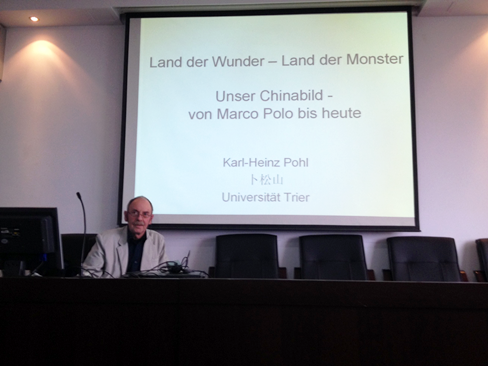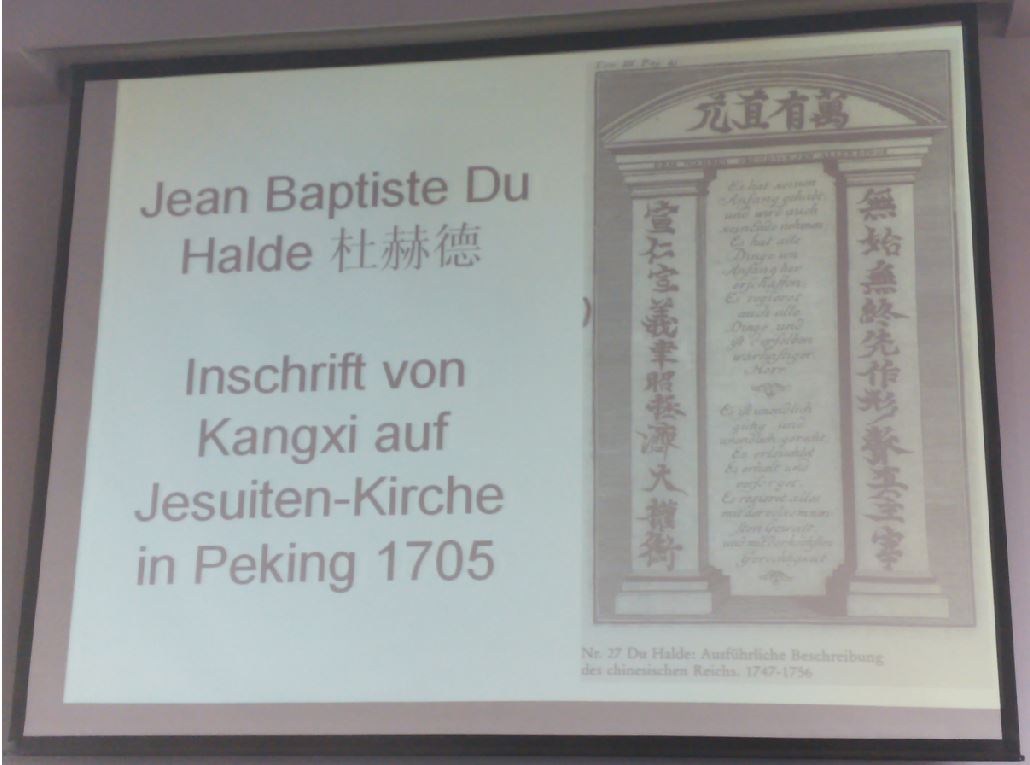At 4 p.m. on Oct. 10th, 2014, Prof. Kar-Heinz Pohl from Trier University, a renowned German sinologist, delivered a lecture entitled “Land der Wunder – Land der Monster: Unser Chinabild von Marco Polo bis heute”(Land of Wonder & Land of Monsters: the Images of China in our minds since Marco Polo) in the lecture hall of the School of Foreign Languages on Jiuli Campus. Prof. Mo Guanghua, Dean of the Department of German, hosted the lecture.
Prof. Pohl began his lecture with the different names for ancient China used by Roman writers such as Seneca and Pliny and then focused on the discussion of Marco Polo' s description of China as the land of wonder in the Yuan Dynasty. He elaborated separately on the highly civilized society harboring Europeans’ yearning in the records by Jesuits in the early period of modern time and the Age of Enlightenment, on the demonized China in the mid-to-late 19th century, on Europeans' rediscovery in the early 20th century of the Chinese doctrine of "content with simple and virtuous life", and on the ups and downs of China's images in the minds of contemporary Europeans after the Second World War against the historical background predominated with competitions in ideologies and economies. Prof. Pohl further indicated that the understanding and perception of China varied along with the changes of economic and politic status of European society and depended to large extent on the communication patterns between Europe and China. Finally, he ended his lecture with a quotation from Talmud, "We see the world, not as it is, but as we are."
In his speech, Prof. Pohl presented plentiful of historical materials and rarely seen pictures to illustrate his points and explained the transmutation history of China’s images in Europeans’ minds. His plain German language interspersed with Chinese Key words enchanted the audience immensely and his depiction of the cultural communication, interaction, bias, and misreading provoked them into deep thinking. His lecture imparted to the teachers and students a self-evident truth that the specific social ideology and stage of political and economic development play a decisive role in the shaping of cultural perceptions.


About Prof. Dr. Karl-Heinz Pohl: Born in Saarlouis, Saarland, Germany (not far from Karl Marx’s hometown Trier) in 1945, he studied at the University of Hamburg, University of Bonn, University of Toronto and majored in Sinology, Japanology and Art history, etc; From 1987 to 1992, he was a professor of Chinese literature and philosophy at the University of Tuebingen; From 1992 to 2010, he taught Chinese in Trier University as the dean of the School of Literature and Media, dean and professor of the Department of Chinese Studies. He has been acting as the president of Académie du Midi Philosophy Research Institute at Trier since 2002, and is the professor of East Asia Research Center at Trier University and Chairman of Trier Eurasian Association. His main research fields include the philosophy history of China, ethics and aesthetics in modern and contemporary China, cross-cultural communication and dialogue between China and the West. His works are as follows: Theory of China’s Aesthetics and Literature, Chinese Thought in the Context of Globalization, Cross-cultural Dialogue with China, Discovery of China: Tradition and Modernity – “Image of China” in a German Sinologist’s Mind, Confucian Spirit and Global Ethic, Zheng Banqiao, Tao Yuanming, etc. He is the chief German translator of The Path of Beauty written by Li Zezhou. He has been invited to give lectures in many universities like Tsinghua University, Renmin University of China, Beijing Normal University, Wuhan University and so on.